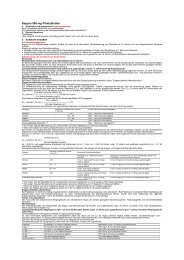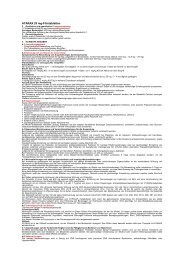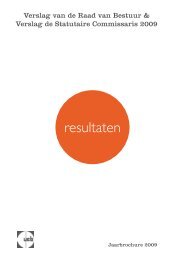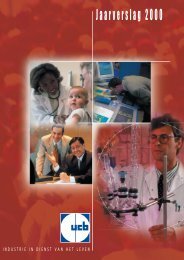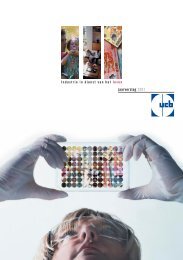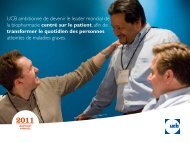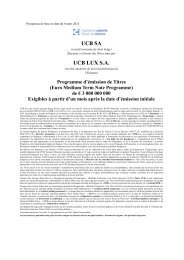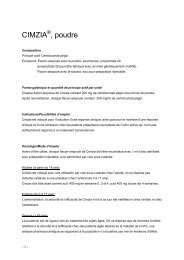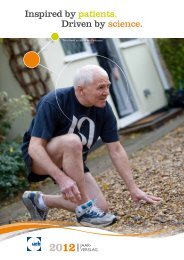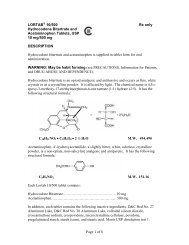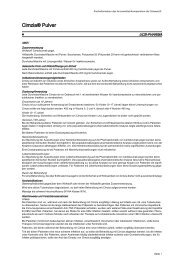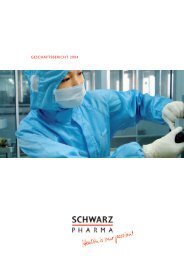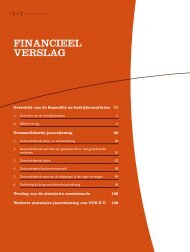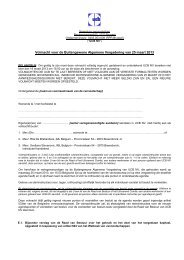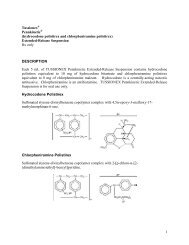UCB SA - BNP Paribas Fortis
UCB SA - BNP Paribas Fortis
UCB SA - BNP Paribas Fortis
Create successful ePaper yourself
Turn your PDF publications into a flip-book with our unique Google optimized e-Paper software.
to become a first choice treatment to add to both older and newer antiepileptic drugs. Vimpat® has<br />
been approved in multiple oral and intravenous formulations.<br />
Within days of its European approval, Vimpat® was launched in Germany and the UK, and physicians<br />
responded positively to the product. Over 13,000 patients have been prescribed Vimpat® in Europe as<br />
of June 2009, resulting in net sales of approximately €5 million as at 30 June 2009. Specifically, around<br />
6,000 patients in Germany and 1,800 in the UK benefit from Vimpat®, and in Germany the Issuer<br />
believes that the launch outperformed the two most recent AED launches. Vimpat® was launched in<br />
the U.S. in June 2009, and 2,900 patients received a prescription in the first two months with net sales<br />
estimated at €18 million by 30 June 2009.<br />
Neupro®<br />
The <strong>UCB</strong> Parkinson’s disease patch, Neupro®, delivers treatment to mimic the action of dopamine<br />
continuously through the skin, providing stable drug levels in the bloodstream 24 hours a day. In the<br />
U.S., Neupro® was launched in 2007 for the treatment of the signs and symptoms of early-stage<br />
idiopathic Parkinson’s disease. <strong>UCB</strong> recalled Neupro® from the U.S. market in March 2008, after<br />
ongoing monitoring revealed a deviation from the approved product specification and crystal<br />
formulation in some batches. In December 2008, the Issuer received a Complete Response Letter from<br />
the FDA which concluded that there was substantial evidence of effectiveness of Neupro® in patients<br />
with advanced Parkinson’s disease. However, the Issuer must first resolve the issue of crystal formation<br />
in the patches before re-launching the drug in the U.S. The dialogue between the Issuer and the FDA<br />
regarding this issue is ongoing, with an extensive update on Neupro® and data concerning the coldchain<br />
storage and distribution system being submitted to the FDA in July 2009, however the outcome of<br />
such dialogue is not certain.<br />
In Europe, Neupro® is indicated for the treatment of the signs and symptoms of early-stage idiopathic<br />
Parkinson’s disease as monotherapy, or in combination with levodopa over the course of the disease,<br />
through to late stages. A complete cold-chain storage and distribution system successfully implemented<br />
by September 2008 has helped control the crystal formation issue and allowed existing patients to<br />
continue their therapy. In June 2009 this storage and distribution system was approved by the EU and<br />
Neupro® is available again to all patients suffering from Parkinson’s disease, including to new patients,<br />
in Europe.<br />
Neupro® was also approved by the EMEA for the treatment of restless leg syndrome in September<br />
2008, and following approval of the cold chain storage and distribution system within the EU was<br />
launched there. There are now approximately 30,000 patients in Europe currently being prescribed<br />
Neupro®.<br />
The FDA accepted the supplemental new drug application for Neupro® as a treatment for moderate-tosevere<br />
restless leg syndrome in December 2007. A response was provided in December 2008<br />
concluding that there was substantial evidence of effectiveness of Neupro® in patients with restless leg<br />
syndrome. As discussed above, dialogue with the FDA regarding approval of Neupro® in both this<br />
indication and in relation to Parkinson’s disease is ongoing, and remains subject to FDA approval of the<br />
cold-chain storage and distribution system proposed by the Issuer.<br />
Keppra®<br />
A11250830/2.25/23 Oct 2009 58



